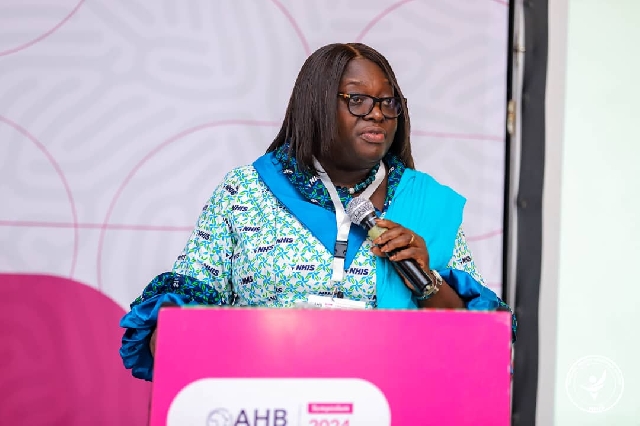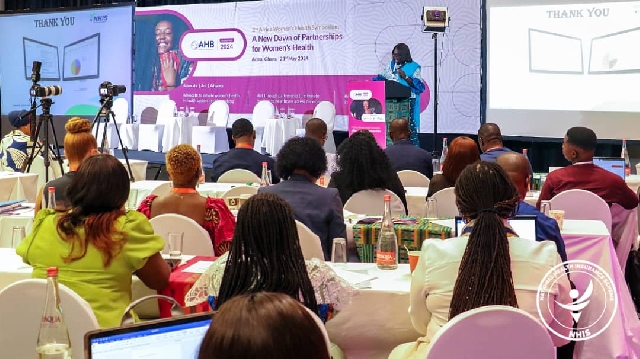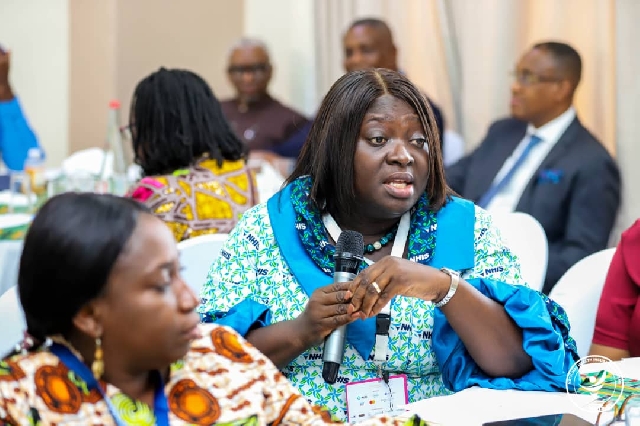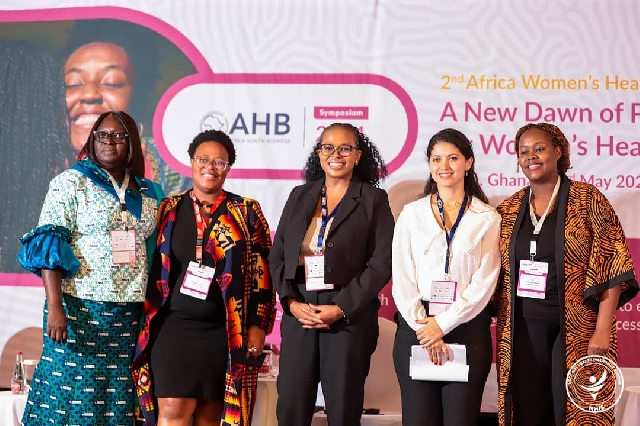NHIA: Dr Yaa Pokuaa Baiden lauds women health promotion agenda
 Dr Yaa Pokuaa Baiden (Mrs)
Dr Yaa Pokuaa Baiden (Mrs)
The National Health Insurance Authority (NHIA) Deputy Chief Executive in charge of Administration and Human Resources, Dr Yaa Pokuaa Baiden (Mrs), has asserted women’s access to equitable healthcare is a fundamental human right.
She, thus, advocates a collective call to action to develop comprehensive strategies for women’s health access.
She was addressing the 2nd Africa Women’s Health Summit held in Accra under the theme: ‘A New Dawn of Partnership for Women’s Health’.

In her keynote address, Dr Yaa Pokuaa Baiden (Mrs.) reiterated the need for renewed synergies between healthcare institutions, the development community and Non-Governmental Organisations (NGOs) to realise the vision of a world where every woman can live a healthy, dignified, and fulfilling life.
She said: “To the private sector and NGOs, let us leverage our collective resources to ensure affordability and equitable distribution of essential medicines. Together, by fostering our culture of innovation and collaboration, we can create a future where access to essential medicines and vaccines is not a privilege but a fundamental human right for all women in Ghana. When women have access to quality healthcare, they are empowered to live healthier lives, contribute more fully to their communities, and build a brighter future for themselves and the families.”
“I can assure you that the National Health Insurance Authority remains steadfast in its commitment to women’s health. We are confident that through continued innovation, we can improve the health of all,” she added.
“To our fellow healthcare institutions, let us share best practices and jointly develop comprehensive strategies for women’s health access. To the research and development community, let us work together to accelerate innovative solutions for women-specific healthcare needs,” she advocated.

Dr Baiden highlighted the need for financing women’s healthcare, healthcare financing models that suit women, innovative ways which Ghana’s National Health Insurance Scheme (NHIS) has employed to increase access to medicines for women in Ghana, the role of public-private collaboration to effectively increase access to women's health products, potential partnerships between governments, pharmaceutical companies, and NGOs to drive innovation.
She said, “Our focus today is on the innovative approaches employed by the National Health Insurance Scheme (NHIS) to increase access to medicines and vaccines for women across the nation. Through visionary policies, strategic partnerships, and community-centred initiatives, NHIS has emerged as a trailblazer in the quest for universal healthcare coverage and gender-sensitive healthcare delivery.
“We at NHIA recognise that better health is intrinsically linked to prosperity, and women’s well-being is central to achieving sustainable development.”
Dr Yaa Pokuaa Baiden (Mrs.) delved into some innovative strategies implemented by the National Health Insurance Authority to enhance access to essential medicines and vaccines for women nationwide. She referenced the introduction of free maternal care, inclusion of Breast and Cervical cancer treatment to the NHIS Benefit Package, and inclusion of Family Planning Services and Partnerships as a model to facilitate access to medicines.
Touching on the specifics, she expatiated, “Among the pioneering initiatives spearheaded by the National Health Insurance Authority (NHIA), perhaps none is more emblematic of innovation and impact than the provision of free maternal care. This groundbreaking intervention stands as a testament to NHIA’s unwavering commitment to ensuring that no woman is left behind in the journey towards safer pregnancies and healthier futures. Under the umbrella of free maternal care, NHIS has dismantled financial barriers that once hindered access to essential healthcare services for pregnant women across the nation.
“By covering the cost of antenatal care, including routine antenatal medications and medications for managing complications of pregnancy such as eclampsia, postnatal care, and emergency obstetric care, NHIS has transformed the landscape of maternal health, making quality healthcare a reality for women from all walks of life.”
She said: “This innovative approach not only saves lives, but also embodies the principles of equity, dignity, and social justice. By removing the financial burden of maternal healthcare, NHIS empowers women to seek timely and appropriate care during pregnancy and childbirth, reducing the risk of maternal mortality and morbidity. Furthermore, free maternal care serves as a powerful catalyst for improving women's health outcomes beyond the maternal period. To ensure that women receive comprehensive healthcare services throughout pregnancy and childbirth, NHIS lays the foundation for lifelong health and well-being, not only for mothers but also for their children and families.”
She underscored the importance of the inclusion of breast cancer treatment and a specialist anti-breast cancer expensive drug called Herceptin to the NHIS Benefit Package, which has so far benefited over a thousand (1000) women suffering from the disease.
“In 2018, the Ministry of Health signed a Memorandum of Understanding with Roche to work together to fight breast cancer in Ghana. This culminated in the signing of a supply contract that reduced the cost of Herceptin by 70 percent. Thereby, allowing the inclusion of the treatment of breast and cervical cancers to the benefit package, an innovative initiative by the National Health Insurance Scheme (NHIS) underscoring its commitment to women's health,” Dr Yaa Pokuaa Baiden said.
“This visionary step represents a significant milestone in ongoing efforts to combat two of the most prevalent and deadly forms of cancer affecting women in Ghana and beyond. By expanding the NHIS benefit package to encompass treatment for breast and cervical cancers, NHIS has not only saved lives but also transformed the landscape of cancer care in the country. For countless women diagnosed with these devastating diseases, access to life-saving treatments such as chemotherapy, and surgical interventions is no longer a distant dream but a tangible reality, thanks to the NHIS,” she announced.
She added, “Prior to this partnership, less than 10 HER2+ breast cancer patients in a year could complete treatment. However, since July 2019, when Herceptin was first made available through the NHIS, approximately a 1,000 Ghanaian patients have been able to access this innovative treatment for HER2+ breast cancer, thanks to the foresight and dedication of NHIA. This represents a profound leap forward in cancer care, offering hope and healing to those facing a diagnosis once considered insurmountable. The NHIA has saved over $19 million through this partnership. This approach to cancer care does not only address the immediate healthcare needs of affected women but also addresses the broader systemic challenges that have long hindered access to quality cancer treatment in Ghana.
“Herceptin, the brand name of Trastuzumab + Recombinant Human Hyaluronidase, is a breakthrough medication used in the treatment of breast, oesophageal, and stomach cancers. Its inclusion in the NHIS benefit package represents a significant milestone in the ongoing fight against cancer, particularly HER2-positive breast cancer, a subtype known for its aggressive nature and limited treatment options. The inclusion of breast and cervical cancer treatment in the NHIS benefit package reflects a commitment to gender-sensitive healthcare delivery and a recognition of the unique health needs and vulnerabilities of women.”
“By prioritising these critical healthcare services, NHIA is taking a decisive step towards closing the gap in cancer care and ensuring that all women can receive timely and appropriate treatment, regardless of their socioeconomic status or geographic location,” Dr Yaa Pokuaa Baiden reaffirmed.
She touted the inclusion of Family Planning Services to the NHIS Benefit Package saying, “The National Health Insurance Authority (NHIA) championed family planning as a vital component of women's health and empowerment. Recognising the pivotal role of family planning in advancing reproductive rights, improving maternal and child health outcomes, and promoting gender equality, the NHIS in 2021 included Family planning in its benefit package.
“Through its network of credentialed healthcare providers, NHIS offers a comprehensive range of contraceptive methods, including injectables, implants, intrauterine devices (IUDs) and tubal ligation at no cost to beneficiaries. By taking up the cost of family planning NHIS ensures that women from all socioeconomic backgrounds have access to a wide spectrum of contraceptive options, empowering them to make informed decisions about their reproductive health and well-being.”
She lauded strategic partnerships as a model to facilitate access to medicines: “Creation of partnerships between local and foreign pharmaceutical firms has also proven to aid in the acquisition and access to medicines. We must, here, be grateful to such partners as they move away from profit-driven motives to efforts at addressing health equities. This can be seen in the areas of vaccine production and anti-malarias. In so doing, remedies to tackle diseases that disproportionately affect women and usually children in developing countries like ours are found. Through these partnerships, essential medicines are not only developed but also made accessible through sustainable distribution channels. The involvement of various stakeholders, including the NHIS, ensures that these medicines reach those who need them most. The NHIA has been instrumental in the acquisition of vaccines in the country. In 2022 the authority purchased for the Ministry of Health vaccines worth 71 million Ghana cedis for distribution countrywide.”
Dr Baiden talked about items on the NHIS medicines list in generic forms.
“In its relentless pursuit of equitable healthcare access, the National Health Insurance Authority (NHIA) has embraced a transformative strategy: the inclusion of medications in their generic names on the medicines list. This seemingly simple yet profoundly impactful approach represents a paradigm shift in pharmaceutical procurement and prescribing practices, with far-reaching implications for women's health and well-being across the nation. By prioritising generic medications over brand-name equivalents, NHIA has not only reduced healthcare costs but also expanded access to essential medicines for women from all socioeconomic backgrounds. Generic medications, which are bioequivalent to their brand-name counterparts but typically more affordable, offer a cost-effective solution to the rising burden of out-of-pocket healthcare expenses faced by many Ghanaian families,” she said.
“This innovative approach not only enhances access to essential medicines for women but also fosters a culture of stewardship and sustainability within the healthcare system. By optimising resource allocation and promoting the use of cost-effective medications, NHIS maximises the impact of limited healthcare funds, ensuring that every Ghanaian woman can access the medications she needs to lead a healthy and fulfilling life,” she added.
She called for tactical Public-Private-Partnership in the journey towards creating a better, healthier future for women everywhere.
“As we celebrate the progress made in improving women's health, we must also acknowledge the critical importance of sustained investment in healthcare infrastructure, workforce training, and research to further advance women's health outcomes. African governments can enter into financing agreements with banks/financial institutions to procure expensive medical and diagnostic equipment in that direction. While we have made significant strides in recent years, much work remains to be done to address the complex and multifaceted healthcare needs of women across the globe. I believe we can achieve this through a Public-Private-Partnership (PPP) health financing model,” she espoused.
Dr Yaa Pokuaa Baiden (Mrs.) celebrated the continuous female dominance in the NHIS active membership ratings, noting, “Official data in 2019 indicated that female members dominated active membership of the National Health Insurance Scheme (NHIS) with a national outlook of 58.6 per cent against 41.4 per cent males. The 2022 national census indicated that health insurance coverage for women was 90 per cent, an increment from the 40 per cent reported for women in the 2008 report.
“With these figures, it is evident that the National Health Insurance Scheme cannot be truly effective without tailored solutions aimed at addressing women's specific health needs.”

The 2nd Africa Women’s Health Summit was spearheaded by a Pan-African consulting firm in Africa known as the Africa Health Business (AHB), in collaboration with Roche, Healthcare Federation Ghana and MSD. The objective was to address the pressing issue of ensuring equitable access to medicines and vaccines for women's health across the African continent.
Source: Haadiya Amadu Yakubu
Trending News

Faulty streetlight blamed for fatal accident on Kasoa Highway
16:03
Minority flags election petitions, youth unemployment and third-term agenda as democratic threats
01:07
Togbui Adu Bobi IV urges CMG CEO to invest in Ho FM's annual health walk as hundreds join 6th edition
02:15
NDC extends Christmas and New Year greetings, reaffirms commitment to governance mandate
14:51
PAOG opens dedicated communication lines for Hajj 2026 enquiries
00:55
Dr Opoku accuses Fourth Estate and Sulemana Briamah of misrepresentation in KGL-NLA deal
05:47
Public outcry grows over silence on October 2024 fatal East Legon accident case
13:54
Don't bring back Dr Bawumia - Political Scientist warns NPP delegates
00:28
V/R: Bee attack on Anloga EP Basic School leaves 2 dead
03:14
DVLA suspends rollout of RFID licence plates over legislative delays
12:18



